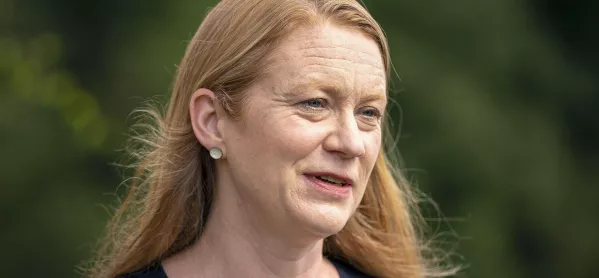What has changed in Somerville’s year as education secretary?

When John Swinney stepped down as education secretary in May last year, he tweeted his achievements after leading education for five years, from 2016 to 2021. Today marks the first anniversary of the announcement of Shirley-Anne Somerville as his replacement and - in the absence of a self-congratulatory tweet to mark the occasion - we have decided to step into the breach and reflect on the past 12 months.
On paper, Somerville could come across as a radical reformer: in the pipeline, we have reform of the qualifications, a commitment to replace the Scottish Qualifications Authority (SQA) and to reform another key agency, Education Scotland. That organisation is to have its inspection function removed and the inspectorate is to, once again, become independent.
Somerville has also promised a substantial increase in teacher non-class contact time of 90 minutes a week.
- One year ago today: Shirley-Anne Somerville is new education secretary
- Quick read: Somerville reluctant to set target dates for closing attainment gap
- Also today: Councils warned ‘clock is ticking’ over teacher pay
- Analysis: Where is ministers’ energy and ambition for Scottish education?
- Two years of Covid: The view of the pandemic from inside schools
Then there are the other smaller but still significant changes that have been introduced over the past 12 months: instrumental music instruction is now supposed to be free in Scotland; charges for subjects like home economics are to have been scrapped; and, in August, P5s became the latest year group to benefit from universal free school meals.
The trouble is that, although much of this is positive, the really meaty changes that have been promised have yet to be realised - and may never be.
The aspiration was that teachers would be spending less time in front of classes by August 2022, but teachers report they are being issued with timetables that do not reflect the change and the word is that councils are saying it will be 2024 before that manifesto commitment can be delivered. We’ll publish a long read on this very issue next Wednesday.
On exam reform, the government has said it believes changes need to be made and it has the assessment expert Louise Hayward working on proposals now. But it remains to be seen if the frustration that so many educators share about how pupils are assessed will be resolved. As Glasgow education director Douglas Hutchison put it, exams are sometimes the most appropriate way to find out what pupils know and can do, but “there are multiple ways that you can cash in your learning…other than an exam for two hours on a wet Wednesday morning”.
Meanwhile, the reform of national education bodies the SQA and Education Scotland could still end up being the damp squib and rebranding exercise that many fear.
The trouble is that while the reform under way might be worthy, it lacks cohesion - what is the end game? Where are we going - and why should weary teachers be excited about it? Maybe we knew at one time, but the waters have been muddied by Covid.
Just now, the government is working its way through a checklist of Organisation for Economic Cooperation and Development (OECD) recommendations that came out when that body’s report on the implementation of Curriculum for Excellence was published in June.
As we emerge from the pandemic, what is needed is a vision of the education system we want to have - something that can inspire and motivate a profession that has been under the cosh for two years.
Somerville clearly likes to err on the side of caution, to stick to the script. Unlike some previous education ministers, you’re unlikely to find officials nervously watching on, wondering when she’ll go off piste.
But for this next phase - when it has to be hoped that Covid will cease to dominate in the way it has - she needs to have the enthusiasm and drive to carry the system with her.
Before she can do that, though, she has to know where she is going.
Emma Seith is a senior reporter at Tes Scotland. She tweets @Emma_Seith
You need a Tes subscription to read this article
Subscribe now to read this article and get other subscriber-only content:
- Unlimited access to all Tes magazine content
- Exclusive subscriber-only stories
- Award-winning email newsletters
Already a subscriber? Log in
You need a subscription to read this article
Subscribe now to read this article and get other subscriber-only content, including:
- Unlimited access to all Tes magazine content
- Exclusive subscriber-only stories
- Award-winning email newsletters



